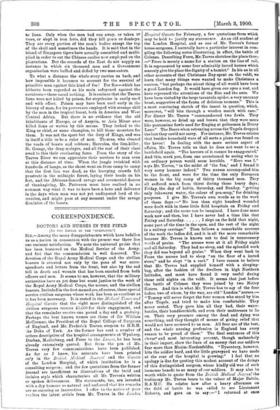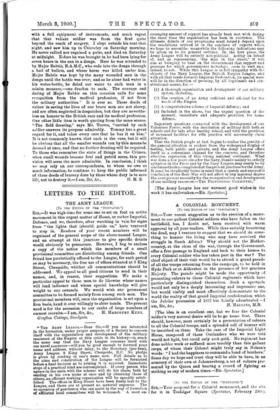CORRESPONDENCE.
DOCTORS AND NURSES IN THE FIELD
[To VII: EDITOR OF THE " SPECTATOR:] SIR,—Among the many disappointments which have befallen us as a nation in connection with the present war there lies one eminent satisfaction. We note the universal praise that has been bestowed on the Medical Service of the Army, and feel that the commendation is well deserved. The devotion of the Royal Army Medical Corps and the civilian bearers is attested not only by the pens of war corre- spondents and letters from the front, but also by the sad toll in death and wounds that has been exacted from both officers and men. It seems to me, however, that the military authorities have as yet done but scant justice to the work of the Royal Army Medical Corps, the nurses, and the civilian bearers. Included in the first-named are, of course, those special service civilian surgeons whose work has been as excellent as it has been necessary. It is stated in the Medical Time3 and Hospital Gazette that the eight more distinguished of the ivilian surgeons receive £5,000 for their engagement, and that the remainder receive one pound a day and a gratuity. Perhaps the best known names are those of Sir William McCormac, the President of the Royal College of Surgeons of England, and Mr. Frederick Treves, surgeon to H.R.H. ;he Duke of York. As the former has sent a number of letters descriptive of the hospital arrangements at Wynberg, Durban, Maritzburg, and Frere to the Lancet, he has been already extensively quoted. But from the pen of Mr. Treves very few communications have been published. As far as I know, his accounts have been printed only in the British Medical .7ourhal and the Gazette of the London Hospital, of which institution he is a consulting surgeon ; and the few quotations from the former journal are insufficient as illustrations of the lucid and incisive style which characterises all Mr. Treves's written or spoken deliverances. His statements, too, are invested with a dry humour so natural and unforced t hat his remarks are as amusing as instructive. I offer to t he notice of your readers the latest article from Mr. Treves in the London Hospital Gazette for February, a few quotations from which may be held to justify my statements. As an old student of the London Hospital, and as one of Mr. Treves's former house-surgeons, I naturally have a particular interest in com- piling the following notes illustrating, in effect, the battle of Colenso. Describing Frere, Mr. Treves sketches the place thus: —"Prere is merely a name for a station on the line of rail. It is represented by some four admirably looted houses which scarcely give the place the dignity of a hamlet." In his as in all other accounts of that Christmas Day spent on the veldt, we learn that many things were wanted to make Christmas a success, "but perhaps the nicest thing of all would have been a good London fog. It would have given our eyes a rest, and have repressed the attentions of the flies and the ants. We have been visited by the large tarantula spider, a very uncanny beast, suggestive of the fauna of delirium tremens." This is a most convincing sketch of the insect in question, which, moreover, "will bite through a wooden match with ease." For dinner Mr. Treves "commandeered two fowls. They were, however, so dried up and brown that they were more like pantomime fowls used for flinging at policemen in Drury Lane." The Boers when retreating across the Tugela dropped the loot they could not carry. For instance, Mr. Treves relates that besides household ware of all sorts a piano was found on the karoo ! In dealing with the more serious aspect of affairs, Mr. Treves tells us that he does not want to see a battlefield again. "The horrors of it cannot be exaggerated.' And this, mark you, from one accustomed to seeing what to an ordinary person would seem horrible. "Here was I," tys Mr. Treves, "In the midst of 'the fan,' and I found it very sorry humour indeed." Two nurses accompanied him to the front, and were for the time the only European women in the big camp of thirty thousand• men. They all suffered much from thirst during those heavy days; Friday, the day of battle, Saturday, and Sunday, "getting only lukewarm water, the colour of pea-soup," for drinking purposes. I give Mr. Treves's own words as to the work of those days :—" No less than eight hundred wounded were dealt with in these little field hospitals on Friday and Saturday ; and the scene can be imagined. I have done some work now and then, but I have never had a time like that Friday and Saturday I slept on the field that night, some part of the time in the open, and the rest of the night in a railway carriage." Then follows a remarkable account of the work the ladies did, and it is all the more remarkable because Mr. Treves is known not to deal in unnecessary werds of praise. "The nurses were at it all Friday night and all Saturday. They had no sleep, and the splendid work they did was beyond all praise." When they went back to Frere the nurses had to sleep "on the floor of a looted store," and he slept "in a cart." I have reason to believe that Mr. Treves had supplied himself with a sleeping- bag, after the fashion of the dwellers in high Northern latitudes, and must have found it very useful during those cold nights on the veldt. It seems that just before the battle of Colenso they were joined by two Netley Sisters. And this is what Mr. Treves has to say of the four ladies, two of whom, by the way, are old " London" nurses :— "Tommy will never forget the four women who stood by him after Tugela, and tried to make him comfortable. They never rested. They gave him all they had, their water- bottles, their handkerchiefs, and even their mattresses to lie on. Their very presence among the dead and dying was something, and they thought of means of giving relief that would not have occurred to us men. All four are of the best, and the whole nursing profession in England has every reason to be proud of them." The final sentences of this clever* and most interesting account, though melancholy in their import, show the lines of an enemy that our soldiers fear more than Maxim-Nordenfeldts. "Dysentery, however, hits the soldier bard, and the little graveyard we have made at the rear of the hospital is growing." I feel that no apology is due for quoting this modest account of the doings of this distinguished surgeon, whose kindly aid was of such immense benefit to so many of our soldiers. It may also he worth while to quote from the British Medical Journal the testimony Mr. Treves bears to the valour of Major Babtie, R.A.M.C. He relates how after a heavy afternoon on the field of battle he was called to see Lieutenant Roberts, and goes on to say :—" I returned at once
with a full equipment of instruments, and much regret that that valiant soldier was from the first quite beyond the reach of surgery. I slept outside his tent that night, and saw him up to Chieveley on Saturday morning. He never rallied nor regained a pulse, and died on Saturday at midnight. Before he was brought in he had been lying for seven hours in the sun in a donga. Here he was attended to by Major Babtie, R.A.M.C., who rode into the donga through a hail of bullets, and whose horse was killed under him. Major Babtie was kept by the many wounded men in the donga until the battle was over; and as he alone bad water in his water-bottle, he doled out water to each man in a minim measure,—one drachm to each. The courage and daring of Major Babtie on this occasion calls for some recognition from the medical profession, if not from the military authorities." It is ever so. These deeds of valour in saving the lives of our brave men are not showy, and are often neglected in despatches, but they are neverthe- less an honour to the British race and its medical profession. One other little item is worth quoting from the same source. "The field dressing," says Mr. Treves, "carried by each soldier answers its purpose admirably. Tommy has a great regard for it, and takes every care that he has it on him." It is not commonly known that such is the case, but it will be obvious that all the smaller wounds can by this means be dressed at once, and that no further dressing will be required. To those who remember the state of things in the Crimea, when small wounds became foul and putrid sores, this pro- vision will seem the more admirable. In conclusion, I think we may rely on our correspondents, to whom we owe so much information, to continue to keep the public informed of these deeds of bravery done by those whose duty is to save life, not to destroy it.—I am, Sir, &c., H. M. S.







































 Previous page
Previous page